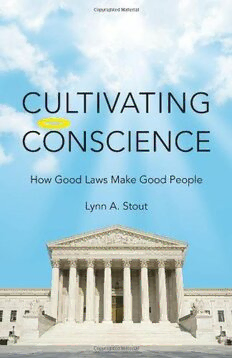Download Cultivating Conscience: How Good Laws Make Good People PDF Free - Full Version
Download Cultivating Conscience: How Good Laws Make Good People by Lynn Stout in PDF format completely FREE. No registration required, no payment needed. Get instant access to this valuable resource on PDFdrive.to!
About Cultivating Conscience: How Good Laws Make Good People
Contemporary law and public policy often treat human beings as selfish creatures who respond only to punishments and rewards. Yet every day we behave unselfishly--few of us mug the elderly or steal the paper from our neighbor's yard, and many of us go out of our way to help strangers. We nevertheless overlook our own good behavior and fixate on the bad things people do and how we can stop them. In this pathbreaking book, acclaimed law and economics scholar Lynn Stout argues that this focus neglects the crucial role our better impulses could play in society. Rather than lean on the power of greed to shape laws and human behavior, Stout contends that we should rely on the force of conscience. Stout makes the compelling case that conscience is neither a rare nor quirky phenomenon, but a vital force woven into our daily lives. Drawing from social psychology, behavioral economics, and evolutionary biology, Stout demonstrates how social cues--instructions from authorities, ideas about others' selfishness and unselfishness, and beliefs about benefits to others--have a powerful role in triggering unselfish behavior. Stout illustrates how our legal system can use these social cues to craft better laws that encourage more unselfish, ethical behavior in many realms, including politics and business. Stout also shows how our current emphasis on self-interest and incentives may have contributed to the catastrophic political missteps and financial scandals of recent memory by encouraging corrupt and selfish actions, and undermining society's collective moral compass. This book proves that if we care about effective laws and civilized society, the powers of conscience are simply too important for us to ignore.
Detailed Information
| Author: | Lynn Stout |
|---|---|
| Publication Year: | 2010 |
| ISBN: | 9780691139951 |
| Pages: | 319 |
| Language: | English |
| File Size: | 1.035 |
| Format: | |
| Price: | FREE |
Safe & Secure Download - No registration required
Why Choose PDFdrive for Your Free Cultivating Conscience: How Good Laws Make Good People Download?
- 100% Free: No hidden fees or subscriptions required for one book every day.
- No Registration: Immediate access is available without creating accounts for one book every day.
- Safe and Secure: Clean downloads without malware or viruses
- Multiple Formats: PDF, MOBI, Mpub,... optimized for all devices
- Educational Resource: Supporting knowledge sharing and learning
Frequently Asked Questions
Is it really free to download Cultivating Conscience: How Good Laws Make Good People PDF?
Yes, on https://PDFdrive.to you can download Cultivating Conscience: How Good Laws Make Good People by Lynn Stout completely free. We don't require any payment, subscription, or registration to access this PDF file. For 3 books every day.
How can I read Cultivating Conscience: How Good Laws Make Good People on my mobile device?
After downloading Cultivating Conscience: How Good Laws Make Good People PDF, you can open it with any PDF reader app on your phone or tablet. We recommend using Adobe Acrobat Reader, Apple Books, or Google Play Books for the best reading experience.
Is this the full version of Cultivating Conscience: How Good Laws Make Good People?
Yes, this is the complete PDF version of Cultivating Conscience: How Good Laws Make Good People by Lynn Stout. You will be able to read the entire content as in the printed version without missing any pages.
Is it legal to download Cultivating Conscience: How Good Laws Make Good People PDF for free?
https://PDFdrive.to provides links to free educational resources available online. We do not store any files on our servers. Please be aware of copyright laws in your country before downloading.
The materials shared are intended for research, educational, and personal use in accordance with fair use principles.

